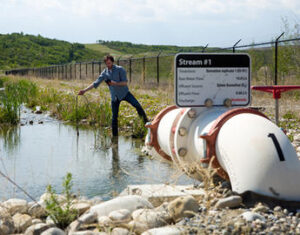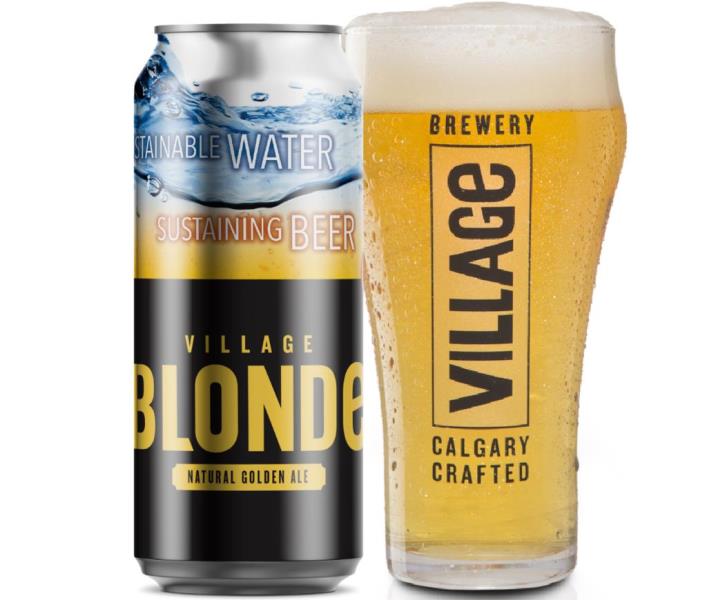In August of 2020, the University of Calgary‘s Advancing Canadian Water Assets (ACWA) partnered with the Village Brewery and Xylem Inc. to produce the Canadian province of Alberta‘s first beer made with “reused water”.
We put “reused water” in quotes because ALL water is reused, and has been for billions of years. With the exception of minute amounts of water arriving on comet fragments, no new water has arrived on this planet in eons. We’re all drinking dinosaur piss.

Program Manager for Advancing Canadian Wastewater Assets (ACWA) Nuno Fragoso conducts a tour around the research facility. Postdoctoral Scholar Jose Luis Rodriguez Gil works in the research streams. Photo courtesy of University of Calgary.
During drier periods, some 70% or more of the flow in the Potomac is tertiary treated sewage, mostly from Pennsylvania. The smell can be quite noticeable during warmer weather, especially at Great Falls National Park, where rapids put the sewage in aerosol form for our breathing pleasure. Water coming from the taps on Capital Hill was flushed down Pittsburgh toilets several days earlier. But we somehow believe it’s magically rendered pure by traveling a few hundred miles downriver.
Tampa, Florida‘s smart mayor, Jane Castor, tried to get a water recycling program approved there last year, but a less-than-smart city council rejected the idea, fearing objections from uneducated voters.
Water reuse will eventually be adopted worldwide, out of sheer necessity (as will insect-based protein). Demonstration projects such as this one in Calgary are essential to making that transition. The beer is on sale now at Village Brewery.
Village Brewery has brewed a limited batch of their Village Blonde ale, using water provided by ACWA. But not just any water this water started as wastewater.
“There’s a mental hurdle to get over of how inherently gross this could be,” said Jeremy McLaughlin, the head brewer at Village Brewery. “But we know that this water is safe, we know that this beer is safe, and we stand by our process.”
What is water reuse?
Water reuse generally refers to the use of reclaimed water. Reusing wastewater as part of sustainable water management provides alternative water sources for human and environmental uses. By using new technologies to treat the existing wastewater more thoroughly, wastewater can be turned into a reliable and safe water supply for many uses.
The “Yuck Factor”
Emotional responses to water reuse are associated with uncertainty, even though our rational scientific understanding tells us it is no different than any other treated water. Can we overcome the “yuck factor” and make using reclaimed water into potable water acceptable? Singapore does. The space station does. Tell us – what do you think?
Is treated wastewater safe?
Yes. An advanced physical-chemical-biological treatment system was used, and monitored for optimal performance. The water used to make this beer met the pathogen reduction requirements and the Canadian Water Drinking Guidelines. An accredited laboratory tested the water after treatment to ensure independent verification of its quality.
Wastewater treatment plants disinfect water to remove pathogens, including viruses. SARS-CoV-2, which causes COVID-19, is an enveloped virus that research shows is particularly susceptible to disinfection.
Why is reusing water important?
Changing climate and growing global populations mean water authorities around the world are looking at treatment options to produce reclaimed water to meet declining fresh water supplies and achieve water security and sustainability.
According to United Nations Water (UN-Water), reclaimed water may help address challenges associated with food production and industrial development. Advanced treatment to produce reclaimed water helps environmental sustainability and protects receiving waters from contaminants.
How was the water treated?
Municipal wastewater was treated in a full-scale Biological Nutrient Removal treatment plant, and then additional advanced treatment was done using ultrafiltration, followed by advanced oxidation (ozone + ultraviolet treatment), then reverse osmosis.
This multi-barrier process was monitored for the full duration of water production to ensure it met criteria specified by Alberta Health Services.
Additional laboratory testing confirmed no presence of disinfection byproducts. Other jurisdictions have developed multi-barrier treatment approaches to similar water reuse projects, including Germany, Sweden, Singapore and the United States.
This is the first project of this kind in Alberta, which allowed policy makers to test and verify a water reuse framework.
“This beer shows that water reuse can be a safe and important part of our sustainable future,” statesChristine O’Grady, the program coordinator at ACWA. “Wastewater can be treated using advanced treatment technology, making it into a reliable and safe water supply for many uses.”
Images courtesy of Village Brewery.


